Albino ferrets are one of the most enigmatic creatures in the animal kingdom. With their snowy white fur and bright red eyes, they never fail to make a lasting impression. Few animals have gained such a strong foothold in popular culture, making them a favorite among pet owners and wildlife enthusiasts alike. But what do we really know about albino ferrets? This article takes a closer look at these mysterious creatures to explore their fascinating characteristics, behavior, and care needs.
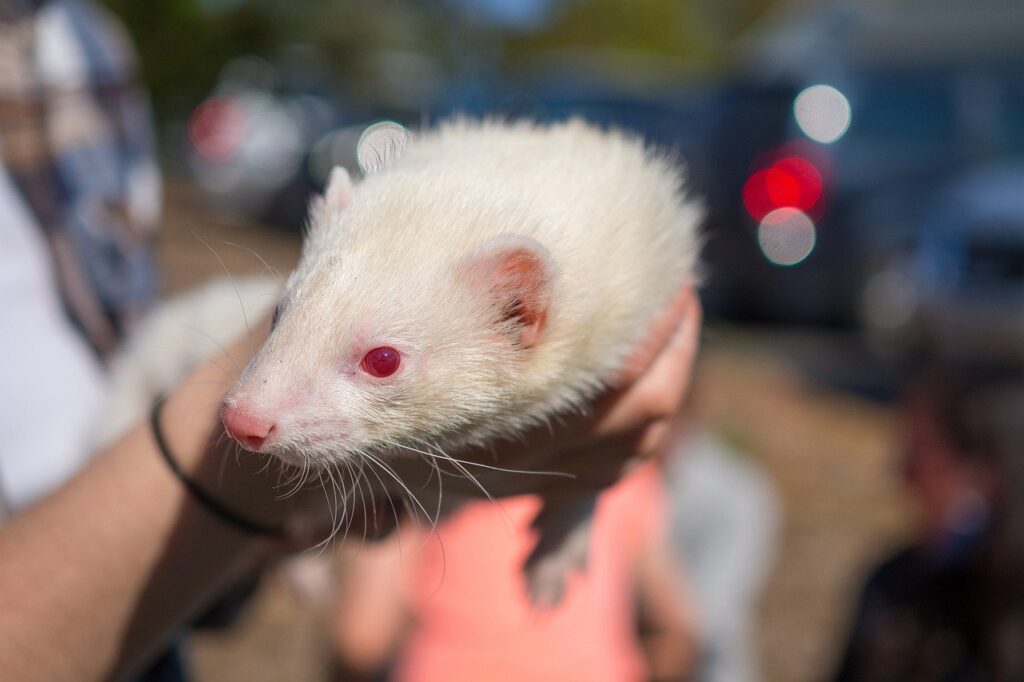
What is an Albino Ferret?
An albino ferret is a rare and unique pet that has become increasingly popular amongst exotic pet enthusiasts. This small, energetic mammal can make an excellent companion for those looking for something different from the usual cat or dog.
Albino ferrets have white, off-white, or yellowish fur with eyes that range from pink to red, depending on the type of albino they are. They are born without pigmentation in their skin, fur, and eyes due to a genetic mutation that gives them distinct features. In addition, their noses and footpads are usually pink or pale grey compared to regular ferrets’ black noses.
Albino ferrets inherit their appearance from the recessive gene both parents carry. The absence of melanin (black color) leaves the animal without any color, so the ferret is white.
The ferret (Mustela furo) is a small, curious mammal in the same family as mink and otters. They are not rodents. They were originally bred to control the rodent population.
What is the Difference Between White Ferrets and Albino Ferrets?
White ferrets and albino ferrets are two distinct types of the same species. Both are friendly, intelligent animals that make great companions. The primary difference between white ferrets and albino ferrets is their coat color. However, all ferret kits are born white, beginning to develop color around three weeks of age.
White ferrets have a normal coat with various colors, including black, brown, sable, cinnamon, silver mitts, and champagne. Albino ferrets have an all-white coat with pink eyes due to a lack of pigmentation genes combined with the presence of red eye genes.
But there are more than just white and albino ferrets. Leucistic ferrets are usually white with blue eyes, and partial leucistic, or piebald, will often have patches of white with regular coloring.
Are Albino Ferrets Rare?
Albino ferrets used to be rare. Selective breeding has changed that. While neither the albino ferret nor the white ferret is no longer rare, they’re not especially common. Natural occurrences of ferret albinism, however, are very rare, limited to 1% or less of the population, half of what typically occurs naturally.
How Long Do Albino Ferrets Live?
Albino ferrets are popular pets and can bring a lot of joy to an owner. But how long will your albino ferret be around? Knowing the average lifespan of an albino ferret is important in planning for its care.

Albino ferrets typically have a life span of 7 to 10 years when kept as pets and cared for properly. A good diet and regular veterinarian visits are essential in helping your pet reach its maximum life expectancy. Ferrets should also receive regular exercise and stimulation since they are active animals that love to play with toys or explore their environment.
If you’re looking for an exotic pet with lots of personality, consider adopting an albino ferret. With proper care, your new friend could be part of the family for many years.
Where Can I Find Albino Ferrets for Sale?
For those looking to purchase a ferret, albino ferrets are an excellent option. Albino ferrets have a unique look that many ferret owners appreciate. While uncommon compared to other ferret colors, finding an albino ferret for sale is challenging but possible.
Pet stores specializing in exotic pets may be the best place to start when searching for an albino ferret. If there aren’t any pet stores near you that specialize in exotics, it’s still worth inquiring with local pet stores as they may be able to special order one for you. You can also check reputable online sources like Ferret Haven and Reptile Reef where you can find albino ferrets advertised by breeders or private owners.
Do Albino Ferrets have Health Problems?
Albino ferrets are some of the most beautiful and unique members of the ferret family. With their particular coloring, they are an eye-catching addition to any home. But do albino ferrets have more health problems than their colored counterparts?
Most albino ferrets have the same health issues found in other ferret breeds. However, it’s important to note that due to their lack of melanin, albino ferrets may be predisposed to certain conditions such as deafness and vision impairment. Additionally, albinos tend to be more sensitive to sunlight than other varieties of ferrets which can increase the risk of developing skin cancer or sunburn if not adequately protected from the sun’s rays. As with any pet, proper nutrition and veterinary care are essential for maintaining a healthy lifestyle for your furry friend.
Are Albino Ferrets Blind?
Albino ferrets are a unique and beautiful breed of ferret, but they have been subject to some controversy. Many people wonder: Are albino ferrets blind? The answer is more complex than it may seem.
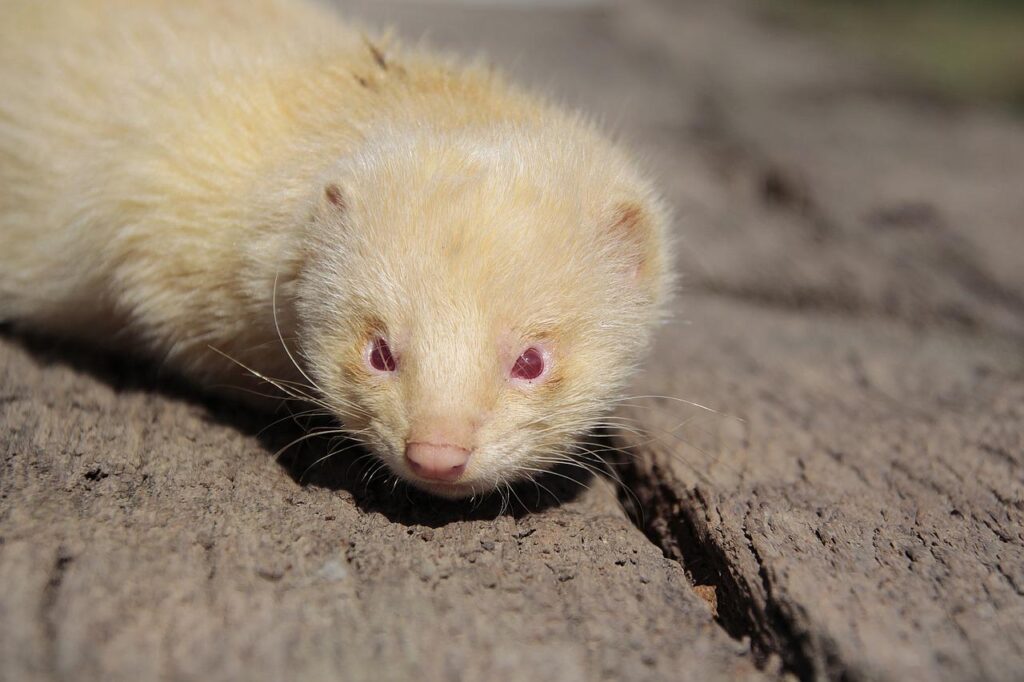
The truth is that albino ferrets can have different degrees of vision, ranging from normal sight to being blinded by their condition. Albino ferrets usually have an eye disorder called oculocutaneous albinism, which causes them to lack pigment in the eyes. This can lead to reduced vision or blindness, depending on the severity. While there is no cure for this condition, there are steps that owners can take to ensure their pet’s comfort and safety, like keeping your pet inside and away from bright light.
Are Albino Ferrets Deaf?
Hearing impaired ferrets are a common question many pet owners have and one that is often debated. Albino ferrets are a popular choice for pet owners looking for an exotic, unique, playful companion. But can they actually be deaf?
Recent research suggests that albino ferrets may not be more likely to be born with hearing impairments than other ferret breeds. That’s because the gene responsible for the animal’s white pigment has little to no effect on their hearing ability. However, this doesn’t mean there’s no risk involved. In some cases, due to genetic mutations or environmental conditions, albino ferrets may still develop hearing problems as they age or become ill.
That said, many albino ferrets are hard of hearing. They have small inner ears that can make hearing a problem. However, it’s the dark-eyed white ferrets that are prone to Waardenburg syndrome, a disease associated with blindness.
What Should I Feed my Albino Ferret?
When caring for an albino ferret, one of the most important aspects of ownership is proper nutrition. Albino ferrets are carnivores and require a diet full of protein and fat. An ideal diet consists of high-quality, commercial ferret food with plenty of proteins, such as chicken, turkey, or beef. In addition to this primary food source, you can supplement your albino ferret’s diet with small amounts of fruits and vegetables like strawberries or peas.
No meat? No problem. For a temporary substitute, kitten food, not adult cat food, suffices until you can supply your ferret with its regular ferret diet.
Treats should also be given sparingly but can include cooked meats like eggs and fish, as well as cooked grains such as oatmeal or rice. Be sure to offer fresh water in a sturdy bowl daily since hydration is vital for your pet’s health.
Can I Train my Albino Ferret?
Yes. Albino ferrets have become increasingly popular as pets in recent years due to their sweet nature and sociability. Albino ferrets are highly intelligent and can be easily trained with the right techniques.
Before training your albino ferret, creating a structured environment is important to help it feel safe and secure. Establishing a regular routine is essential for setting expectations and providing consistency when training your pet. Start by teaching basic commands like sit or stay, using positive reinforcement such as treats or verbal praise when your ferret performs the desired behavior. It may take some patience, but soon enough, your albino ferret will respond to simple commands in no time.
Final Thoughts
The albino ferret is an intriguing pet with a unique white coat and pink eyes. With proper care, knowledge of diet and exercise, plus regular grooming, these ferrets can live healthy lives. The albino ferret’s playful nature and intelligence make it popular among small animal lovers. Taking the time to understand your pet’s needs will ensure you both have a special bond that lasts for many years.
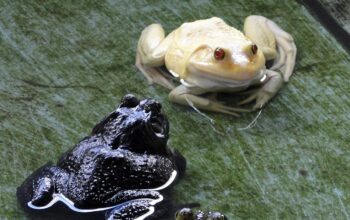
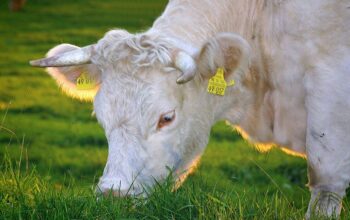
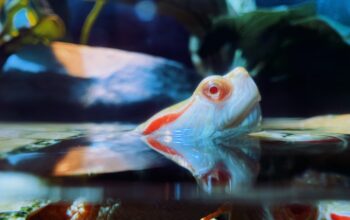
How can I find out more about it? http://www.ifashionstyles.com